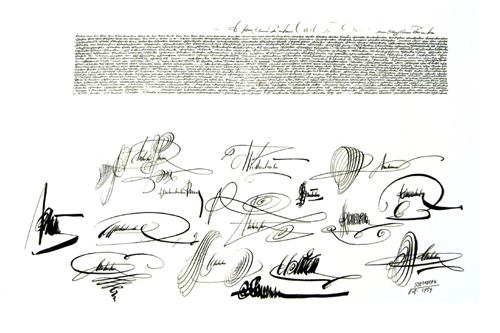
Mr. Oliver
November 10, 2008
I enrolled in a music appreciation class when I was a high school student. Near the beginning of the semester, the teacher of the class took ill and a substitute, Mr. Oliver, replaced him. Mr. Oliver knew his subject well. He played us everything on the school record player from Schubert’s Unfinished Symphony to Peruvian folk songs to Duke Ellington and he spoke articulately and with great enthusiasm about each piece of music. This led to interesting and sometimes provocative class discussions. But Mr. Oliver had several things working against him as he sought to implant the magic of music in our young minds. As a substitute teacher, the length of Mr. Oliver’s stay was unpredictable. It was quite possible that he might not even be responsible for our grades at semester’s end—an open invitation to misbehave. Mr. Oliver needed to put his foot down and demand proper comportment, but this was not in his nature. We often spoke out of turn and passed notes back and forth directly under his nose. Another thing that worked against Mr. Oliver’s inability to control the class was that he lisped and spoke in a high, effeminate voice. We poked fun at Mr. Oliver’s voice, his gestures, and the way he pranced around the classroom, trying valiantly to illuminate the history of music for us. Our behavior was insensitive, even cruel, but teenagers are works very much in progress.
As the weeks passed and our unruliness continued, word got back to the principal about Mr. Oliver’s Music 101 class. We soon learned that he was to be fired. The news was shock therapy. In an emergency meeting convened by the entire class, which numbered approximately fifteen students, there was little disagreement: Mr. Oliver was an excellent teacher and our behavior had been unconscionable. Something had to be done to stop his dismissal. We decided to write a letter of support for Mr. Oliver. I cannot remember the exact wording but undoubtedly the letter enthusiastically endorsed Mr. Oliver as a teacher and asked that he be kept on. Each and every student signed his or her name under the statement that was then promptly delivered to our principal.

Saul Steinberg, Untitled (The Declaration of Independence), 1959, Pen and ink on paper, 14″ x 22 1/2″
Afterwards, I thought little of the letter or its possible impact on the decision by the administration to keep Mr. Oliver on for the duration of Music 101. I had so many more important things on my mind: girls, getting my driver’s license, hanging out with friends. Years later, when my thoughts drifted back to school days, I would occasionally remember Mr. Oliver and feel guilty about my poor behavior. But then I would comfort myself with the thought that “Kids will be kids,” and banish Mr. Oliver from my mind.
After a Guarneri String Quartet concert in Los Angeles some ten or twelve years ago, a man came backstage to greet me. “You won’t remember who I am,” he said in a high-pitched, rather effeminate voice. But I did.
“Mr. Oliver?” I gasped.
The man’s jaw dropped. “Good lord, you do remember me!”
“Yes, of course I remember you,” I said.
“Then you will also remember this.” Mr. Oliver reached into the inner pocket of his jacket and produced a yellowed, folded piece of paper. He opened it carefully and handed it to me. Before my eyes was the letter our class had written forty years earlier with fifteen signatures underneath. I recognized several of the names, others had slipped from my memory long ago. I spied my schoolboy signature and below it the signature of Carl P., a highly gifted boy who had committed suicide some years later. Suddenly, the past rushed at me rudely, painfully. Mr. Oliver and Carl had had many lively conversations about… what? Mozart? Sibelius? The past wrapped itself around me more tightly. I smelled the wood and lead of the school pencils, felt the hard, unyielding writing desks, and heard Mr. Oliver’s voice as he tried to extol music’s virtues over the din caused of overactive and underdisciplined teenagers.
Mr. Oliver broke my reverie. “Do you realize what this letter means to me?” he asked. “Your words and signatures not only saved my job but also restored my confidence. I was going through some tough times when I taught that music appreciation class. This letter was a real turning point in my life.” I stood overwhelmed before Mr. Oliver, unable to speak. Mr. Oliver took back the letter, returned it carefully to his pocket, congratulated me on my concert, and after a few pleasantries, was gone.
Subscribe
Sign up to receive new stories straight to your inbox!





































































































































































Comments
Touching!
Can I sign my name for Mr. Oliver too?
Thank you very much for sharing.
Best regards,
Jiu
Arnold,
As you know, I was also in Mr. Oliver’s class. I wonder if you remember that our friend Carl, along with Barry S., somehow found out that Mr. O. had had some traumatic experiences in WW II, which had left him with a degree of what used to be called shellshock, now referred to as post- traumatic stress syndrome. Our playful, if cruel, friends, Carl and Barry, would sit at the back of the class and mimic the sounds of an air raid, the whistle of fallling bombs (as learned from war movie sound effects) and crack up at Mr. O’s expression of terror, or what they construed as such. We all thought it was funny then, but maybe not so much so later. Carl did indeed take his own life later, but some time earlier he told me that he had written a story in which I, as a character, had committed suicide! And I am still here, and have for over 50 years continued to enjoy your artistry and your friendship.
Leave a Comment
*/